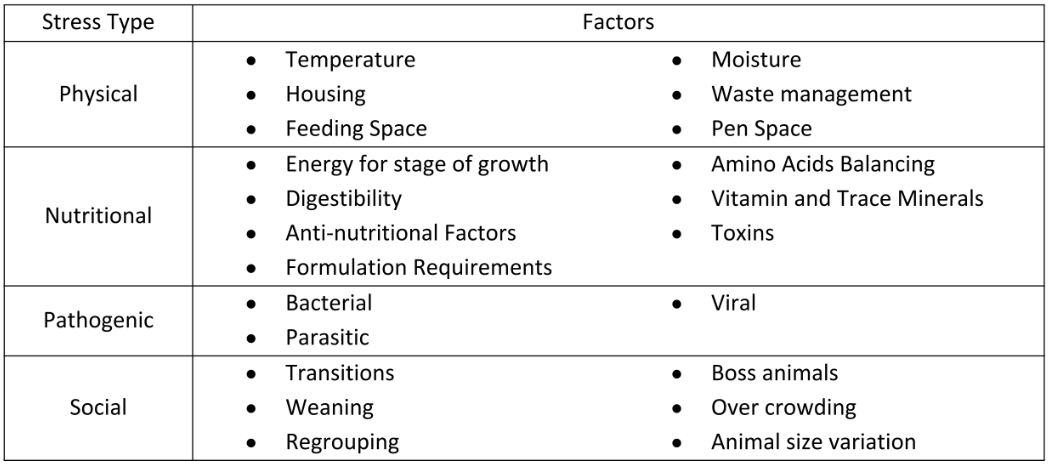Impacts of Stress on Nutrient Partitioning on Domestic Livestock Production
Background: Proper nutrition is imperative for maintenance, immunology, reproductive efficiency, growth and gain in livestock production. Meeting minimum prerequisite levels are imperative for simple animal husbandry, but in many cases, can be optimized to provide accelerated productivity. This is especially true of intensive livestock production practices, when stocking density, environmental factors, management, nutrition and ingredient selections impact the profitability of the operation. By increasing the scale of livestock production, operations' profit per unit of protein produced may become more efficient, but requires diligence to both measure and manage factors that may impact livestock performance. Stress may take many forms in these operations and, if left unchecked, may be the difference between being profitable and not being able to break even.
What Is Stress?: Stress can be defined as factors that may impact the homeostatic condition of the animal and, additionally, impact livestock productivity. Stress in livestock may come in many forms, but can be broken into physical, nutritional, pathogenic and social types (Table 1). Some of these are easier than others to identify, while many are only detectable based on a rigorous data collection to measure impacts on performance of an animal or groups of animals. Impacts of stress may also be multifactorial in that one stress type alone may not impact performance, but multiple stressors concurrently may manifest in decreases in feed intake, poor feed conversion, immunological challenges, decreases in health status and higher risks for morbidity.
Table 1. Factors that comprise stress type.
Stress Impacts on Nutrient Partitioning: Depending on the class of livestock (i.e. feeder, reproducing, finishing, etc.), diets should be formulated to meet that animal's nutrient requirements to meet the homeostatic maintenance needs, or net energy maintenance (NEm). In addition, diets should be formulated to achieve growth or lactation targets for that species' net energy gain (NEg) or net energy lactation (NEl), respectively. Stressors may cause a shift in the NEm in livestock, as animals may not consume enough nutrients to meet their maintenance needs, or may cause a shift in how the animal partitions nutrients to maintain a homeostatic condition. Regardless of the scenario, the outcome results in poorer performance; and if the stressors exist for a prolonged period, risks for morbidity and mortality may increase due to the animal not being able to maintain minimum NEm.
Feed Ingredient Selection: Most formulators in the livestock industry select ingredients based on nutrient and digestibility values. However, opportunity to improve on animal productivity exists by selecting macro ingredients that not only provide the necessary nutrients but also provide functional benefits that may reduce the impacts of stress not easily controlled by the producer. The Branded Feed team innovates by understanding the nutritional requirements of the animal, but also the systems and stressors that livestock may endure. The results of such technologies allow for animals to better meet their genetic potential.
Cargill Branded Feed creates proprietary feed ingredients to improve digestive health and performance for production animals in the beef, dairy, aquaculture and pet food markets. Branded Feed is a segment of Cargill Starches, Sweeteners & Texturizers (CSST).

